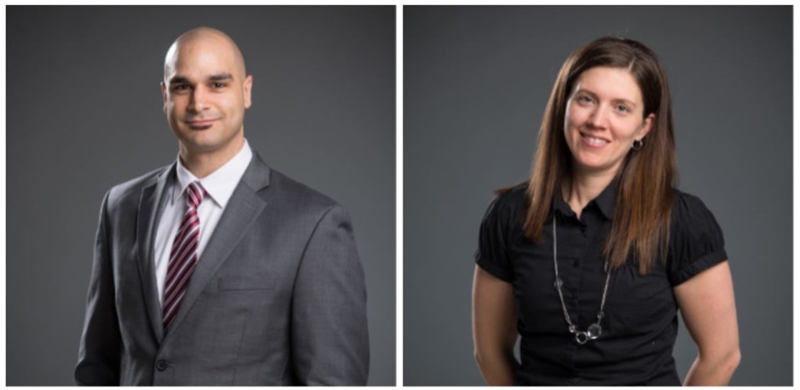Involving the community in health research projects
Author: UNB Research
Posted on Nov 20, 2020
Category: Research

Dr. Danielle Bouchard is adamant that any research she does needs to be meaningful to her participants. “Knowledge transfer is significant to me,” she explains. “I love to see the results of research projects reach the community so people can have a better lifestyle because we have proven the benefits.”
Dr. Bouchard and Dr. Martin Sénéchal are associate professors in the faculty of kinesiology at UNB and are co-directors of the CELLAB on the Fredericton campus. In 2015, they co-founded their laboratory to study the impact of exercise on metabolic and functional health, from the cellular level to the community level.
Both do research with aging adults with or without specific diseases. They have a common goal: using physical activity to improve health. Bouchard leads research mostly around functional abilities (e.g. ability to live independently, while Sénéchal leads studies mostly around metabolic health (e.g. diabetes, obesity). They supervise about 15 undergraduate and graduate students working with them on research and employ 10 people at the lab space itself.
One of the unique things about their work is that community members play a crucial part in their research projects. They’re involved in the design of studies, implementation and in knowledge transfer. “It is important to involve who we do this for at the end.”
Dr. Bouchard explains that the main goal of her research is to identify strategies to have more people become regular exercisers. Her current projects focus on older adults in the community and long-term care.
One such program is called Stand if You Can.
“With age, the functional abilities such as walking, balance and strength decline - all of which are associated with life expectancy, number of visits to the hospital and length of stay, or number of falls. It’s been shown that older adults living in long-term care homes are sitting or lying 23 hours per day, on average! Standing more could lead to functional benefits and positive health outcomes for this particular population. The Stand If You Can program's goal was to stand 100 minutes per week for 5 months in four nursing homes in New Brunswick. Students worked with residents who had support family members and staff through the project. The functional, psychosocial, and physical health of participants will be compared with control-receiving visits only.”
Dr. Bouchard hopes that the study will prove that standing will lead to a better quality of life and perhaps fewer falls and trips to hospital. While staff in the homes have already perceived an improvement in the residents, statistical analyses are underway.
Another project of Dr. Bouchard’s is called Zoomers on the Go.
“Research has found that peer-led exercise programs can increase participants' self-confidence, increase physical/functional health, and offer a space for socialization. Zoomers on the Go was developed for both peer leaders and participants over the age of 50. The 12-week program offered across the whole province is free for anyone in N.B who is 50+ and is offered in French and English. Participants perform exercises using home equipment like balls, elastic band and chairs in person or now online. We’ll follow them via their health administrative data for as long as 10 years following their participation in the group to look for health care outcomes.”
For his part, Dr. Sénéchal is doing a trial right now to study the benefits of walking for people living with diabetes.
It’s well known that the blood sugar levels can be regulated with exercise, but many people with diabetes do not achieve blood glucose control individually. The strict trial will find out who responds to exercise by controlling blood sugar - and who doesn’t. In the second wave of the trial, participants will be randomized to a more extended trial or more intense workouts, to see if greater blood glucose control can be achieved for those who don’t respond to typical exercise.
He’s also leading a community study with a group of older, more frail diabetics to learn more about the effects of a lifestyle modification program for improved functional ability and quality of life. The 16-week program requires just 40 minutes of exercise per week – better for those who are hesitant about exercise - and is offered across the province in partnership with health authorities.
Dr. Bouchard and Dr. Sénéchal are clearly passionate about their work, and they create opportunities for their students learn experientially as well.
“Most of our studies are conducted by graduate students. And staffing needs are opportunities for undergraduate students to receive hands-on learning. And they love it. It’s a really intensive and effective way to understand research and how to work with participants.”
Dr. Bouchard says that some programs are delivered and tested outside the lab, directly in the community, while others are offered either online or in the CELLAB space.
“Even throughout the pandemic (once UNB opened back up again), the lab gym has been a busy spot on campus. Participants feel safe and protected, and graduate students are happy to complete trials. We’re in full PPE and the lab is a very safe place for them to come.”
“COVID or not, it’s important that we continue our research for the scientific community. We’re happy that research funding attracted through the CELLAB allows us to offer exercise programs for community members. In return, the research participants serve science. Everyone gets something from it. It’s wonderful to be able to do such important work that benefits people we see every day.”
Registration is open for some of the programs – to find out more about them, and other research conducted there, visit the CELLAB website. If interested connect with the CELLAB at cellab@unb.ca or 506- 458-7034.
And check out a video of Dr. Bouchard, Dr. Sénéchal and their students giving a tour of the CELLAB and talking about their work!